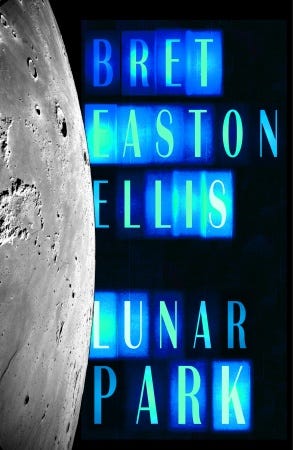Lunar Park Reviews and Coverage

Yesterday, as part of a roundup of the Sunday reviews, I posted references to a couple of less-than-rave reviews for Bret Easton Ellis' new novel Lunar Park. The question I'm asking today is, was anyone surprised by that?
It seems to me that some critics should just not be allowed to review Bret Easton Ellis.
This is a bit goofy, so bear with me here...
Authors such as Ellis, are so controversial, so divisive, and so already well-discussed that a critic should have to state his allegiance or at least passing admiration for the writer before he attempts a review. Like Norman Mailer and a handful of others, I challenge you to find someone who is lukewarm on Bret Easton Ellis. Most people either like his work or hate it. And most people, fans and critics alike, know what they're getting when they buy a new Ellis novel. So what's the point of negative reviews? It's not like hoards of unsuspecting book buyers are going to stumble onto Lunar Park and snatch it up without knowing a thing about the man and his work and only an intrepid reviewer can spare them and their 25 bucks.
I have always enjoyed and admired Bret Easton Ellis' work. And viewed through the lens of a longtime fan, I thought there were a lot of good aspects of Lunar Park. But am I surprised The New York Times didn't like it? No. The only thing that surprised me was that they didn't unleash Michiko Kakutani on it.
Here's my point: a negative review that you can see coming a mile away has no more validity than a rave review by a fan gushing over his favorite writer. Let's discuss another medium for a moment and turn our attention to the music industry.
It's obvious to any observer that no one told the folks at Rolling Stone that music has continued past the sixties and seventies. When the magazine chose its 500 Greatest Songs of All Time, only two songs in the top 25 were released after 1975. In the 25 years since 1980, only 82 songs were chosen for the list but a 9-year period in the sixties produced 202 entries on the greatest list. Now, it's their magazine and they can like whatever they want to like. Every reader knows their philosophies towards music and what they respect.
So what would you be willing to wager that Rolling Stone would review an Ashlee Simpson record and have something good to say about it? It's obvious that they're going to hate it, so why bother with the review? It's as obvious and predictable that they're going to hate that pop record as it's obvious and predictable that the fans at Mugglenet.com are going to love the new Harry Potter.
I've loved Chuck Palahniuk's work ever since the first edition of Fight Club was released. But even as a fan, I wasn't overjoyed with Haunted and wrote that in a review. And as weird as it sounds to say, I would wager that I, as a fan, gave that book a more objective shot than many critics who can't stand the man's work. And the same goes for Ellis.
I know book reviews in the major outlets mean book sales and all that. But quite frankly, I would have preferred some publications not even discuss Lunar Park than to go through the predictable steps of trashing it.
It's late, I'm tired, probably babbling and this probably makes no sense. So to sum it up, a predictably bad review from a so-called objective reviewer has no more integrity and validity than a rave review from a gushing fan. And in many cases, the fans can actually be more objective than the critic with an axe to grind.

